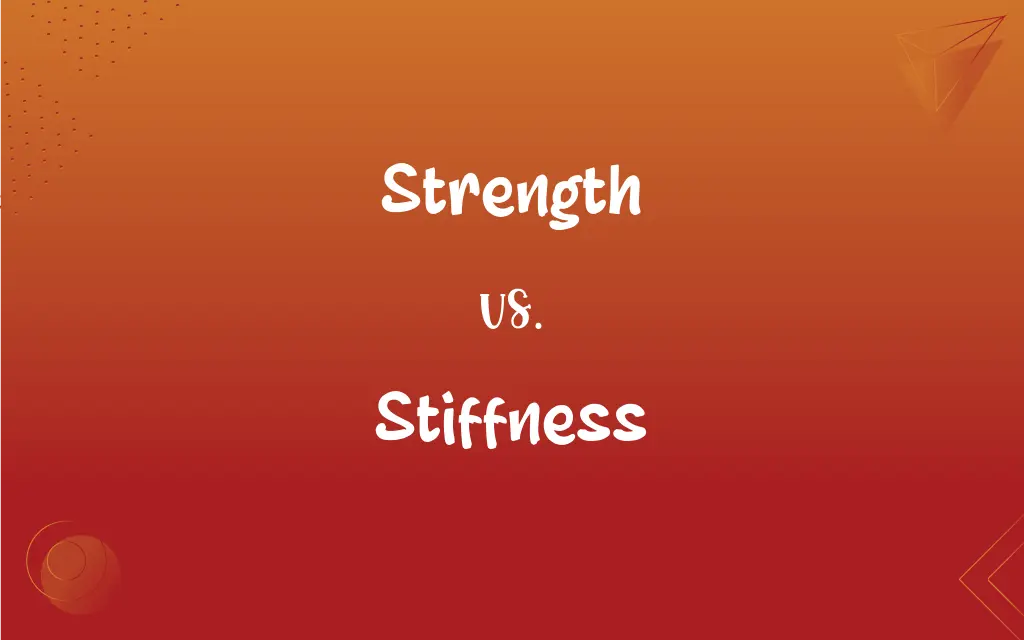Strength vs. Stiffness: What's the Difference?
Edited by Aimie Carlson || By Janet White || Published on November 28, 2023
Strength refers to a material's ability to withstand an applied force without failing, while stiffness describes its resistance to deformation under load.

Key Differences
Strength in materials science is the ability to endure an applied force without breaking or yielding. Stiffness, on the other hand, refers to a material's resistance to deformation when a force is applied.
The strength of a material determines its capacity to bear loads, stress, or pressure before failing. Stiffness dictates how much a material deforms under a given load, influencing its rigidity.
High strength in a material means it can support heavy loads or resist high stress without fracture. A high level of stiffness implies that the material will not easily bend or stretch under load.
Strength is crucial in applications where materials must bear high stress or weight, like in construction. Stiffness is key in applications where minimal deformation is desired, such as in precision tools.
Materials with high strength might not always exhibit high stiffness, as some strong materials can be flexible. Conversely, stiff materials may not always be strong and can be brittle under certain stresses.
ADVERTISEMENT
Comparison Chart
Definition
Ability to withstand force without failing
Resistance to deformation under load
Key Feature
Determines load-bearing capacity
Dictates rigidity and deformation extent
Material Behavior
Endurance under stress or weight
Rigidity under applied force
Importance
In high-stress applications like construction
In applications requiring minimal deformation
Relation to Flexibility
Strong materials can be flexible
Stiff materials may be brittle
ADVERTISEMENT
Strength and Stiffness Definitions
Strength
Strength is the capacity of a material to resist failure or breakage.
The steel's strength made it ideal for skyscraper construction.
Stiffness
Stiffness is the resistance of a material to deformation.
The beam's stiffness prevented it from bending under weight.
Strength
Strength reflects how much force a material can endure.
The rope's strength was crucial for mountain climbing safety.
Stiffness
Stiffness indicates how rigid a material is under load.
The high stiffness of the spring ensured precise operation.
Strength
Strength in materials signifies their load-bearing ability.
The bridge's strength was tested to support heavy traffic.
Stiffness
Stiffness relates to how little a material bends or stretches.
The stiffness of the guitar strings affected the sound quality.
Strength
Strength is crucial in determining a material's application.
The high strength of the alloy made it suitable for aerospace engineering.
Stiffness
Stiffness is measured by the extent of deformation under force.
Testing the stiffness of the material was crucial for the design.
Strength
Strength is a measure of endurance under various stresses.
The material's strength was tested against both tension and compression.
Stiffness
Stiffness is important in materials where flexibility is limited.
The stiffness of the ceramic made it ideal for high-precision molds.
Strength
The state or quality of being strong; physical power or capacity
The strength needed to lift a box.
Stiffness
Difficult to bend or fold
Stiff new shoes.
A stiff collar.
Strength
The capacity to resist attack; impregnability
The strength of the ship's armor.
Stiffness
Not moving or operating easily or freely; resistant
A stiff hinge.
Strength
The capacity to resist strain or stress; durability
The strength of the cables.
Stiffness
Lacking ease or comfort of movement; not limber
A stiff neck.
FAQs
How is strength measured?
Through load-bearing tests, like tensile and compression tests.
What does strength mean in materials?
The capacity to withstand force without failing.
What is stiffness in a material?
Resistance to deformation under an applied load.
What tests measure stiffness?
Tests that determine how much a material deforms under load.
Why is stiffness important in engineering?
For applications where minimal deformation is required.
Can a material be strong but not stiff?
Yes, some materials are strong but flexible.
What role does strength play in construction?
It determines the load-bearing capacity of structures.
Are stiffness and flexibility opposites?
Yes, stiffness implies less flexibility.
Does high strength imply high stiffness?
Not necessarily; they are independent properties.
Is it possible for a material to be stiff but not strong?
Yes, stiff materials can be brittle and not very strong.
Where is stiffness a key factor?
In precision machinery and load-bearing applications.
In what applications is material strength crucial?
In high-stress environments like aerospace and automotive industries.
What influences material stiffness?
Material composition and internal bonding.
Is tensile strength the same as overall strength?
Tensile strength is one aspect of overall material strength.
How do temperature changes impact strength and stiffness?
They can alter both, depending on the material.
Are strength and stiffness important for safety?
Yes, in ensuring structural integrity and performance.
How do materials' strength and stiffness affect design?
They dictate the choice of material based on load and deformation requirements.
Can strength and stiffness be altered?
Yes, through material composition and processing.
What factors affect a material's strength?
Composition, structure, and temperature.
Does stiffness affect a material's weight?
Not directly; it's more about deformation resistance.
About Author
Written by
Janet WhiteJanet White has been an esteemed writer and blogger for Difference Wiki. Holding a Master's degree in Science and Medical Journalism from the prestigious Boston University, she has consistently demonstrated her expertise and passion for her field. When she's not immersed in her work, Janet relishes her time exercising, delving into a good book, and cherishing moments with friends and family.
Edited by
Aimie CarlsonAimie Carlson, holding a master's degree in English literature, is a fervent English language enthusiast. She lends her writing talents to Difference Wiki, a prominent website that specializes in comparisons, offering readers insightful analyses that both captivate and inform.







































































